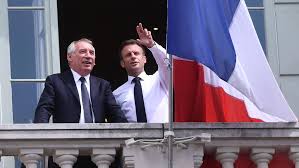


PARIS, Dec 13, 2024 (BSS/AFP) - President Emmanuel Macron on Friday named centrist leader Francois Bayrou as prime minister, handing him the daunting task of hauling France out of months of political crisis.
The 73-year-old head of the MoDem group which is allied to Macron's party, was appointed nine days after parliament ousted Michel Barnier's government in a historic no-confidence vote following a standoff over an austerity budget.
"The president of the Republic has appointed Mr. Francois Bayrou as prime minister and tasked him with forming a government," the presidency said.
Bayrou's appointment sparked immediate criticism, with the hard-left France Unbowed (LFI) party and the Greens threatening to back a new motion of censure aiming to bring down his government.
The announcement capped hours of drama that saw Bayrou summoned to an Elysee meeting followed by speculation Macron could name another figure amid reports the talks had been tense.
Bayrou is the sixth prime minister of Macron's mandate after the toppling of Barnier, who became France's shortest-serving prime minister lasting only three months.
He is also Macron's fourth prime minister of 2024.
Bayrou faces an immediate challenge to form a cabinet that can survive a no-confidence vote in a divided parliament and thrash out a 2025 budget in a bid to limit economic turmoil.
- 'Reconciliation needed' -
"Everyone knows how difficult the task is," Bayrou told reporters.
"Everyone knows a way must be found to bring people together rather than divide them. I think reconciliation is needed," he added.
Barnier, 73, was to take part in a handover ceremony Friday afternoon. The new cabinet was expected to take days however.
Bayrou will be tasked with holding dialogue with all political forces except the far-right National Rally (RN) and hard-left LFI parties "in order to find conditions for stability and action," a member of Macron's team said on Friday.
"Francois Bayrou's name emerged in recent days as the most consensual" choice said the source, asking not to be named.
The RN and LFI joined forces to topple Barnier's government.
Macron has been confronted with a complex political equation since snap parliamentary elections in July -- how to secure a government against a no-confidence vote in a bitterly divided lower house where no party or alliance has a majority.
LFI chief Jean-Luc Melenchon and RN parliamentary leader Marine Le Pen had not been part of the most recent talks.
- 'Listen to the opposition' -
Le Pen suggested that Bayrou's appointment might lead to new deadlock.
"We are asking him to do what his predecessor was unwilling to do: listen to the opposition and build a reasonable, well-considered budget," she said on X.
The RN is the largest single party in the National Assembly. But the left-wing New Popular Front (NFP), which was put together to prevent the far-right from coming to power, emerged as the largest bloc after the elections.
Bosses of the NFP alliance that includes the Socialists, Communists and Greens as well as the LFI had demanded that Macron appoint a prime minister from their ranks.
The members of Melenchon's hard-left party threatened to table a new motion of censure.
"It's yet another insult to democracy," Manuel Bompard, a senior LFI lawmaker, said on X. "To topple Bayrou is to topple Macron."
Socialists quickly posed conditions for not supporting a no-confidence motion in an open letter to Bayrou.
He must agree not to ram laws through without a parliamentary vote and not to rely on support from the far right, the party's board said, adding that they would not accept ministerial posts.
Green Party chief Marine Tondelier told BFMTV that her lawmakers would have "no other choice" but to censure Bayrou's government if it does not change its economic policy and if hardliner Bruno Retailleau is kept as interior minister.
Macron was first expected to name a new prime minister in an address to the nation last week. In a sign of the stalemate, Macron did not name Barnier's successor then and missed a 48-hour deadline he gave at a meeting of party leaders on Tuesday.
Opinion polls have indicated the public is fed up with the crisis, with just over two-thirds of respondents to an Elabe poll published on Wednesday saying they wanted politicians to reach a deal not to overthrow a new government.